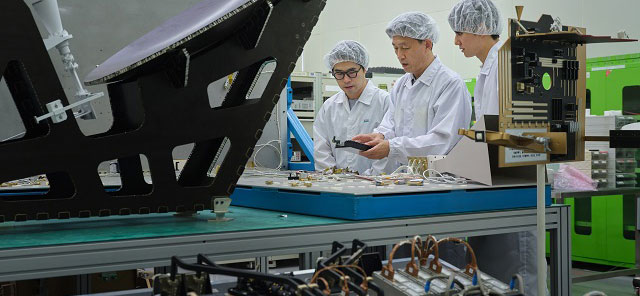한국전자통신연구원(ETRI)은 17일 국방과학연구소(ADD)와 전 세계적으로 관심이 고조되고 있는 위성통신 기술분야의 협력 강화를 위한 업무협력을 추진하기로 했다고 밝혔다.
6G 저궤도 위성통신 기술 협력 나서
민국 협력 국내 위성통신 산업 활성화
국내 연구진이 6G 위성통신 기술 선점 및 세계화를 위해 힘을 모은다.
한국전자통신연구원(ETRI)은 17일 국방과학연구소(ADD)와 전 세계적으로 관심이 고조되고 있는 위성통신 기술분야의 협력 강화를 위한 업무협력을 추진하기로 했다고 밝혔다.
양 기관은 기존 체결했던 △IT 기술과 국방기술의 융합을 통한 연구개발 역량 강화 △연구개발 정보 교환 △연구시설 및 장비의 공동 활용 △우주기술분야 등에 대한 협력을 진행할 예정이다.
이번 협력을 통해 현재 공동 추진하고 있는 초소형위성체계개발 사업, 한국형 위성항법시스템(KPS) 개발 사업의 협력을 공고히 하며, 저궤도 위성통신 관련 협력을 본격 추진할 계획이다.
연구진은 “이번 협력은 정부의 양 부처 간 작년 업무협약의 후속으로 연구소 간 협력을 강화하는 차원에서 추진되며, 우리나라 민·군을 대표하는 양 기관이 힘을 모은 것은 매우 큰 의미가 있다”고 말했다.
통신규약을 정의하는 국제전기통신연합 전파통신부문(ITU-R)에서 지난 6월 2030년대 서비스를 목표로 하는 6G 서비스 비전으로 IMT-2030 프레임워크를 완료한 바 있다. 저궤도 위성통신이 시·공간 제약을 극복하는 6G 통신 서비스의 핵심으로 급부상하고 있다. 이는 미래국방 통신, 재난재해 뿐만 아니라 도심교통항공(UAM), 비행기 내 대규모 인터넷, 해상의 선박 등 다양한 미래 서비스를 제공할 것으로 기대된다.
한편 작년 12월에는 과학기술정보통신부와 방위사업청이 민·군 간 위성통신 기술 발전을 위한 업무협약을 체결한 바 있다.
ADD 박종승 소장은 “저궤도 위성통신은 국방 및 국가 우주개발에 있어서 새로운 도약의 기회가 되고 있다. ADD에서는 초소형 위성, 한국형 저궤도 전술위성군 등 국방 우주기술을 선제적으로 확보 중이다. ETRI와 이번 민·군 협력을 통해 상호협력과제 모델을 발굴하고 국가 우주기술 경쟁력 확보로 국방과 안보에 기여하겠다”고 말했다.
ETRI 방승찬 원장도 “6G 통신은 지상과 위성이 통합되는 서비스로 차츰 커지면서 다양한 서비스로 발전할 것이다. 유사시에는 저궤도 위성의 활용성이 더욱 높을 것이다. 미래 국방을 선도하는 ADD와의 기술 협력 체계 구축을 통해 6G 위성통신 기술개발을 선도하고, 우리나라의 위성통신 산업을 활성화하는 데 앞장서겠다”고 밝혔다.
향후 ETRI와 ADD는 기술 교류 및 공동 연구개발 등 실효성 있는 R&D 협력체계를 구축하여 양 기관 발전의 발판을 마련하고, 6G 저궤도 위성통신 기반의 핵심기술을 확보, 우리나라의 위성통신 산업 육성 지원을 확대해 나갈 예정이다.
